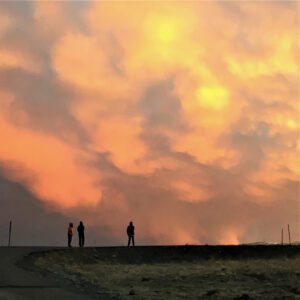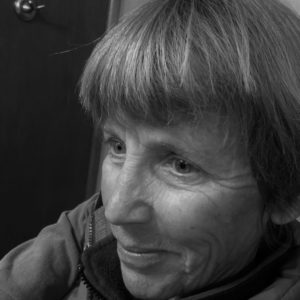 Among my mother’s possessions when she died was a wooden box, a box exactly the size of the one in which we buried her ashes. It had a sticky latch, a latch that seemed to tell us no, not yet, there are other tasks to take care of. So for weeks the box sat where it had always sat, under a table—a handsome mahogany table—beside a bookcase filled with dozens of books written about cruising the Maine coast. On top of the bookcase was a stack of every navigational chart imaginable from Block Island to Penobscot Bay and on up to New Brunswick. My parents were enthusiastic sailors.
Among my mother’s possessions when she died was a wooden box, a box exactly the size of the one in which we buried her ashes. It had a sticky latch, a latch that seemed to tell us no, not yet, there are other tasks to take care of. So for weeks the box sat where it had always sat, under a table—a handsome mahogany table—beside a bookcase filled with dozens of books written about cruising the Maine coast. On top of the bookcase was a stack of every navigational chart imaginable from Block Island to Penobscot Bay and on up to New Brunswick. My parents were enthusiastic sailors.
But they weren’t just sailors, they were night sailors. They took classes at an organization called the Power Squadron where both of them soon became instructors. My father’s title was “Commander,” my mother’s was “Lady Proficient.” The Power Squadron had never had a woman instructor before Mom came along, and they and their bylaws were seriously lacking in imagination. Mom’s favorite class to teach was Celestial Navigation. She was a math major and found in the skies another source of mathematical beauty. If you knew how to read the stars you would never be lost, and if you knew how to use a sextant you would know your exact position on the globe and be able to steer your ship toward certainty.
In the box made of teak with a sticky latch, we found her sextant. It was at that moment, opening the box and finding that beautiful, useful, ingenious tool inside, that I began to understand who we had lost. It was just like her, that sextant. In form it was pleasing, in design brilliant. Its purpose was to keep us safe, to promote safe passage, to use the skies as our informants. I remembered a night sail with my parents, northward through Massachusetts Bay. We left the lights of Boston behind and sailed out under a tent of stars. My mother tried to teach me how to use that strange and wonderful instrument. How I wish it had stuck, but it did not. I do remember her words, just two of them: Find Polaris.
I live at the foot of Observatory Mesa. From my front porch I can look aloft and see the telescope housing up at Lowell, and a short walk up my street leads me onto the mesa itself with its undisturbed woodlands and far views out over town, south to Mormon Mountain and north to the San Francisco Peaks. I walk in the evening, by chance more than design. At that hour the late light butters the grasses and shoots gold through the pines and the city falls away. With luck I’ll spot a coyote, and if I’m walking with my friend Lynne, she has a keen eye for antelope. The train rolls by. I hear it at a distance and its sound is welcome, like a reliable heartbeat. When the darkness comes my feet find the way, and I do hear my mother’s voice, a quiet voice with the ocean behind it. Find Polaris, she says.
How fortunate we are to have these acres of open land in the middle of a city. How fortunate we are to live high up among the stars, closer to the sky, with guides in every corner of the realm, eager to show us the rings of Saturn or the Triangulum Galaxy only 2.3 million light-years away. How fortunate that our darkness benefits our neighbors up the hill at the observatory. This allows me to search for and find Polaris while standing in my pajamas in my front yard.
When I was a hiking guide in Grand Canyon, the evening’s entertainment was always a short walk down below the campground to the boat beach where the sky was a magic carpet, a long and narrow celestial design. The river was a mirror, the big eddy there, and city people marveled at the stars in the water and the stars above them. One couple from London brought their two sons, ages nine and eleven, just to see for the first time what the night sky looked like.
Celestial navigation is more than the art of the sextant. It’s the use of all our senses in finding our way in the dark—by the light of the stars, the moon, or the darkness itself. We’re unaccustomed to the beauty of the night. This shrinks our world by half. “The night walks the same road as the dream,” says the Russian proverb. And the tidy Swiss say, “The night rinses what the day has soaped.”
The day we buried Mom a steady rain was falling. The sky was unreadable. Her ashes were not her—I knew that. I was with her when she died and she died completely out of her body. She was gone moments after her last breath. In those last moments, her eyes were as wide as I’d ever seen them. Wide and blue. She looked with such intensity past the four of us who were there beside her bed. She looked into another place, I would guess another world. She was a confident navigator, even in this transition, this movement of energy from a seen, felt and heard being to something we have no words for. When I seek her out now I go directly to the stars, because even though it was never spoken, in her own way she let me know: Find Polaris and you’ll find me.

